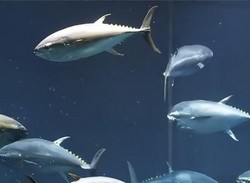
World-first transfer of early juvenile yellowfin tuna to sea cage
Kinki University, the Inter-American Tropical Tuna Commission (IATTC), and the Autoridad de los Recursos Acuáticos de Panamá (ARAP) are reporting important results from comparative studies of the early life history and reproductive biology of yellowfin and Pacific bluefin tuna. Scientists have conducted the joint research at the IATTC’s Achotines Laboratory, located in the Republic of Panama, and the Fisheries Laboratories of Kinki University in Wakayama Prefecture, Japan.
The latest research milestone reported for the project is the successful transfer of juvenile yellowfin tuna from laboratory tanks to a sea cage located near Achotines Laboratory. This activity represents the first successful transfer worldwide of yellowfin early-juveniles to sea cages.
The juveniles stocked in the sea cage, raised from larvae hatched from eggs spawned by captive yellowfin tuna broodstock, were 52 days old and ranged in length from 9 to 13 cm. Kinki University scientists and ARAP staff, supported by scientists and staff of the IATTC, conducted the juvenile rearing at Achotines Laboratory, where IATTC scientists have previously reared yellowfin juveniles to 100 days of age in laboratory tanks on an experimental basis.
The recent rearing and sea cage transfer of yellowfin juveniles by Kinki University and ARAP expands upon the earlier IATTC rearing studies, by utilizing Kinki University’s large-scale juvenile rearing practices developed in Japan and adapting them to yellowfin rearing.
The joint research programme began in early 2011 and will continue through March 2016. The studies are producing important comparative findings on the reproductive biology, genetics, and early life history of yellowfin and Pacific bluefin tuna in order to improve the conservation and management of both species.
The study findings have included comparative descriptions of maternal contributions to spawning through genetic sampling, comparative estimates of growth potential during the early life stages, and comparative descriptions of development and feeding ecology of the early life stages of both species.
The joint project is being implemented under the Science and Technology Research Partnership for Sustainable Development (SATREPS). The studies conducted in Japan are supported by the Japan Science and Technology Agency (JST) and Kinki University, and the studies undertaken in the Republic of Panama are supported by the Japan International Cooperation Agency (JICA), the IATTC and the ARAP.
The five-year SATREPS study brings together decades of research expertise on tunas and marine fishes by the participating organizations.
The Fisheries Laboratory of Kinki University has been the world leader in studies of the spawning and rearing of Pacific bluefin, and since 2002 has successfully completed annual full-life-cycle rearing of Pacific bluefin tuna in captivity.
The IATTC has maintained a spawning population of yellowfin tuna in landbased facilities at Achotines Laboratory since 1996 (a world first), where ongoing experimental studies of yellowfin early life history have been conducted for 18 years.
The ARAP is responsible for the protection and proper utilization of aquatic resources of Panama, and has successfully collaborated with the IATTC at Achotines Laboratory on multiple research projects during the past 25 years.


ساحة النقاش